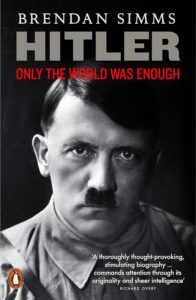In Martin Kerr’s list of books recommended in his introduction to National Socialism, we can see this subheading, ‘Books Hostile to National-Socialism but Still Containing Valuable Information’. In line with this literary advice this year I bought a book, Hitler: Only the World Was Enough by English biographer and historian Brendan Simms. Half a year ago I had already written something about Hitler but now, that I am willing to read it carefully, I could start a new series.
Simms’ book, once purged of its anti-Nazi sentiments, serves me wonderfully for the point of view of The West’s Darkest Hour: the Anglo-American world has been the villain of our film. This viewpoint contrasts dramatically with what George Lincoln Rockwell believed, and is much closer to the position of Francis Parker Yockey.
Hitler: Only the World Was Enough begins with a magnificent epigraph, some words from the Führer himself: ‘In the end man takes his livelihood from the earth, and the earth is the trophy which destiny gives to those peoples who fight for it’. Lebensraum!
Some of the final chapters contain striking titles: ‘England is the motor of the opposition to us’, ‘The struggle against the Anglo-Saxons and plutocracy’, and ‘The Fall of Fortress Europe’.
The prologue contains the key to deciphering Simms’ thesis. Hitler’s biographer informs us that on July 17, 2018, brigade adjutant Fritz Wiedemann wrote that Private First Class Hitler dropped off two American prisoners at the headquarters of 12 Royal Bavarian Infantry Brigade. Simms adds: ‘This, then, is when all it began’ because these doughboys were the descendants of German immigrants, lost to the Fatherland for lack of living space (not enough Lebensraum). In subsequent discourses, Hitler repeatedly came back to the moment, in the mid-summer of 1918, when the first American soldiers appeared on the battlefield of France: ‘Well-grown man, men of our own blood, whom we have deported for centuries, who were now ready to grind the motherland itself into the mud’. In Hitler’s mind, only the Lebensraum east was ultimately to become the remedy because he wanted to imitate the US somehow, an extensive ‘spacial formation’ he said elsewhere.
Already in the Introduction, Simms gives brief reviews of the major works on Hitler and criticises their authors for not having seen this reality, including Alan Bullock, Joachim Fest, Ian Kershaw, Peter Longerich and other standard biographers of the anti-Nazi System under which we live: biographers who deal with other facets of Hitler’s personality. Simms then sets out his thesis.
What he offers us is an intellectual biography of Hitler, from his first conception of Germany’s history and its role in the world in the wake of defeat in World War I, to his conviction that the main enemy was neither communism nor the Soviet Union, nor even international Jewry, as has hitherto been repeated even in racialist forums; but Anglo-Saxon capitalism and, primarily, the United States. While most historians have argued that Hitler underestimated the American threat, Simms shows that Hitler embarked on a pre-emptive war against the United States precisely because he considered it the main adversary and the only one that could destroy Germany. The Third Reich domination of virtually all of Europe, the war against the USSR and the annihilation of European Jewry were chapters in a race against time to turn the Reich into a power capable of confronting Anglo-Saxon leadership and, if not defeating it, at least achieving a bipolar world balanced between the stark Anglo-Saxon finance capitalism and a German Reich rooted in the Germanic racial tradition.
Simms’ thesis is not entirely original. As we also read in the Introduction, Adam Tooze has shown to what extent the US must be considered the main reference for the Third Reich from its very beginning. In the Intro Simms also mentions the sources he used for his massive biography of Hitler. In addition to the official texts, he includes the memoirs and diaries of those close to the Führer. But he is very emphatic in stressing that
While the connection between Hitler’s anti-Semitism and his anti-capitalism is often noted, and has been the subject of some individual subjects, its centrality to his worldview, and the extent to which he was fighting a war against ‘international high finance’ and ‘plutocracy’ from start to finish, has not been understood at all.
To understand it I would advise the visitor of this site to familiarise himself with the realism of theorists such as John Mearsheimer, who teaches us how States think and how they relate to each other.
